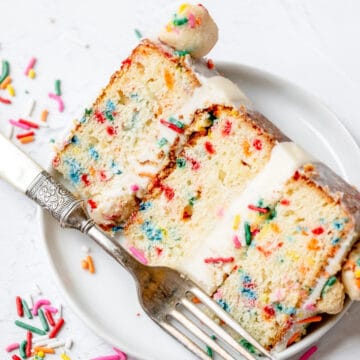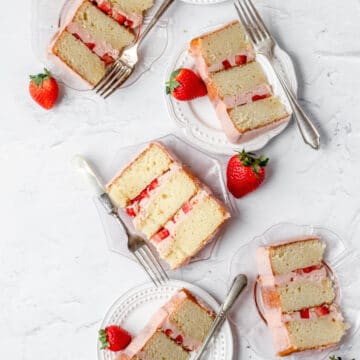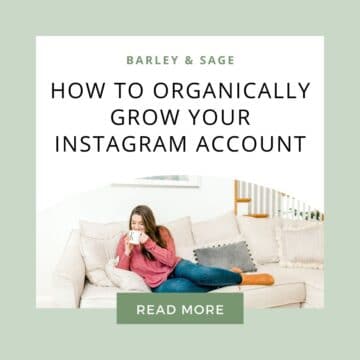Copyright and licensing can be incredibly confusing for new photographers but it's SO important! I'm going to walk you through the basics of what copyright is and why you should be including licensing in your food photography contract!
Disclaimer: I am NOT an attorney and I am not an accountant. This post should be interpreted as my opinion and not legal advice. I highly recommend seeking advice from a personal business attorney and CPA about your specific situation.
Jump to:
What is Copyright?
As a photographer you automatically own the copyright to your images the second you press the shutter button. You own the copyright to that image for your entire life and for 70 years afterwards.
Whether it’s photography on your hard drive, online portfolio, or a post on your Instagram feed, you have exclusive rights to your image according to the Copyright Law of the United States of America. This includes:
- Reproducing your photography
- Preparing derivative works based on your photography
- Distributing copies of your photography to the public (by sale, rental, or lease)
- Publicly displaying your photography
Owning the copyright on your photography doesn’t require any special paperwork, or having the © associated with your image. The copyright will automatically apply once you post your photography online because at that point, it exists in a “tangible medium.”
The only exception to this rule is when your photography falls into the “work-for-hire” category. A work-for-hire relationship is created in two situations:
- The photographer is an employee hired to take photographs for an employer. For example, a photographer employed by a publication that receives a salary and benefits.
- The photographer is hired and signs a written contract that specifically states that the work is to be considered Work-for-Hire.
The work-for-hire agreement will relinquish any rights the photographer has to the work created for the client. I personally don't ever do work-for-hire and I don't recommend it!
Do you need to register your copyright?
Short answer no, but you should.
Copyright registration is voluntary and is generally seen as a formality to make your photography part of the public record. But if you ever need to take legal action against copyright infringement, having your work registered will benefit you!
If your photography is not registered with the U.S. Copyright Office prior to an infringement, a photographer may only recover “actual damages” instead of “statutory damages.” Meaning, the photographer is only entitled to the “fair market value” of their work, instead of what could be up to a $150,000 award, plus legal fees.
It's best practice to register your work with the US copyright office within 3 months of publication. However, you can batch register up to 750 photos at a time if you prefer! So I just wait until I have enough for a batch and file a couple times a year.
If you want register a copyright for your photography, you can through the U.S. Copyright Office website.
What To Do if Your Photos are Used Without Your Permission
I've heard the very problematic rumor that if you post a photo online, it's fair game for others to use. This is NOT true. You own that image and you have the authority to decide how it's used.
- Request photo credit - If you don't mind the use of your photo, you can simply request that credit is properly attributed to you.
- Prepare a DCMA take-down notice - If you just want the photo taken down, you can prepare this notice. The DMCA website explains more here.
- Prepare a cease and desist letter - Either you or a lawyer can prepare a letter to either request a payment of an appropriate license fee for the use of your image, a photo credit with a link to your website, or if that doesn’t work, ask that they cease the use of your image.
- File a copyright infringement lawsuit - This is the most aggressive option and you'll need to hire an attorney. However, if a client is using your images in a way that goes against your contract, it's basically a slam dunk.
If an account on Instagram uses one of your photos without your permission, you can also just report it to IG as a copyright violation and they'll remove the image. You can report images as copyright violations even if they account has given you credit!! Why? Because you're still the owner of that image and have the final say in how it's used. I often have very spammy accounts repost my images with credit and I still report them because it doesn't benefit me.
So What Is Licensing?
Image licensing is when you essentially let your client "rent" your photo for commercial use. You're outlining exactly how the client can use your image and for how long. Licensing is a great tool for making sure you get paid fairly for your work and protects you from your images being used in ways that were not agreed upon. It's also super important to make sure the image licensing is spelled out in your contract!
For food photography you'll be dealing with a Commercial Use License. This means the images are used with the intent to sell a product, raise money, promote or endorse something.
There are a few main questions you'll need to ask your client to determine the type of license and how much you need to charge. I created a Client Inquiry Form that's super helpful for image licensing!
- How does the client plan to use your image? Digital? Print?
- How long does the client want to use your image?
- Does the client want to run paid ads with your images?
- Does the client want exclusive rights to that image?
Why does this matter? Because a brand will be directly making money off of your photos! You deserve to be compensated for your part in that! This is also why I don't believe in working for free or in exchange for product. Regardless of your skill level, if a brand uses your image to market their products, you should be paid!
If a brand wants to purchase the exclusive rights to use the photo, prices range from 50 to 100 percent of the original production fee. If a brand wants to purchase the copyright to your photos (meaning they now own the photo and you can't use it anymore) the price ranges from 100 to 200 percent of the production fee. But keep in mind that the biggest reason one would wish to purchase the copyright is because they plan to resell the image. In almost all cases, it makes sense for the photographer to retain their copyright and simply license the image for specific usage. Some brands will think they need to buy the copyright but they really don't, so you just have to politely educate them.
If you're curious how to charge for image licensing (because you absolutely should be charging) you should check out my pricing guide for food photographers!
More Food Blogging Resources
Browse more food blogging resources →





Maria says
Hi, Kyleigh! This was a great post! I have a question about the licensing. If it's a smaller brand and they likely haven't worked with many (if any) food photographers, how would you explain the licensing aspect? Also, how long would you offer/recommend they license for 5 holiday recipe images (from the same shoot) + 5 product images (unrelated to the holiday recipe)? Do you offer 1 year of licensing? 2 years? 5 years? And how do you price based on the duration of licensing? It seems like a lot of smaller companies think they will own the images that they're paying you to create and they don't understand the higher pricing. I had a company ask me for 30 images with 5 - 6 different styles/themes with unlimited licensing for "a maximum of $250". 🙁
Monique says
Hi! I love your page and I am learning so much from your posts about photography business. Thank you for sharing all these information as I am so confused to where to start learning the business side of photography. I am reading this post about copyright and licensing and I was about to click, what I think is a hyperlink that’s supposed to direct me to another post about charging image license, but for some reason I can’t. 😅